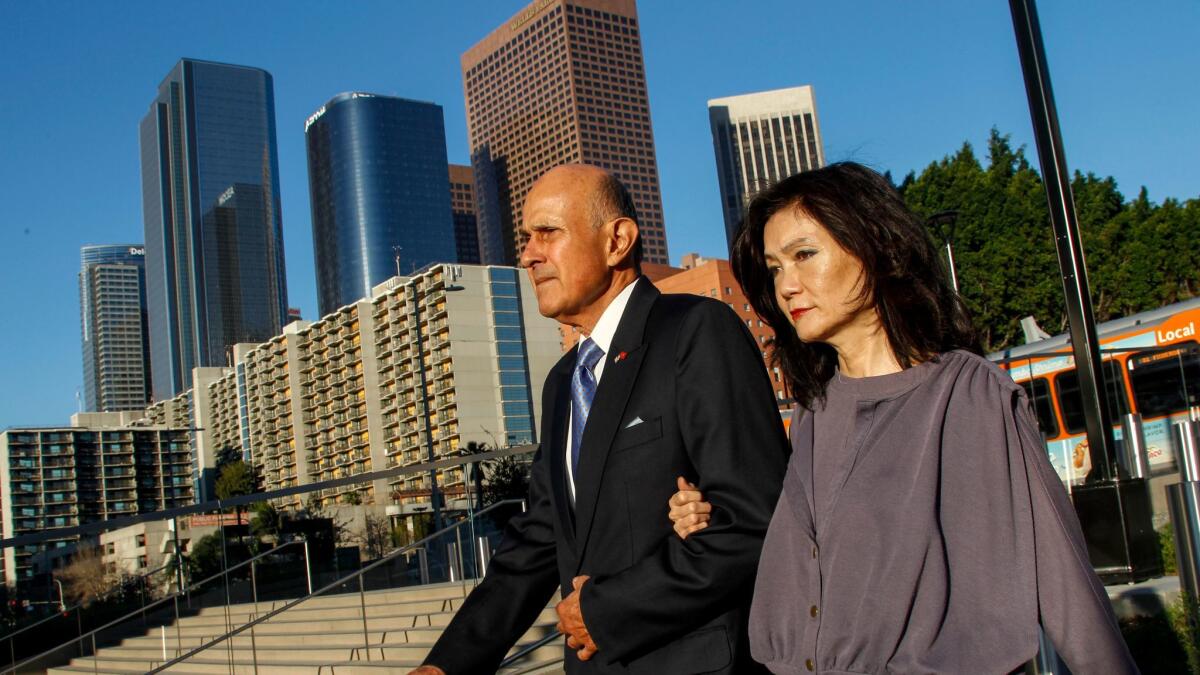Closing arguments in Baca obstruction retrial offer conflicting motives for actions of former L.A. County sheriff

- Share via
In their final words at the end of a bruising retrial, federal prosecutors and an attorney for former Los Angeles County Sheriff Lee Baca painted contrasting portraits of the man — as a selfish coward who used subordinates to carry out a plan to obstruct an FBI investigation and a transparent leader who acted reasonably and decisively to protect others.
“A king,” Asst. U.S. Atty. Brandon Fox called Baca — one of several times he returned to a chess analogy to describe Baca and his actions. “A king who is now trying to disown everything that happened. ‘Don’t blame me, blame them.’ That’s not how a leader acts. That’s how a criminal acts.”
In closing arguments Monday morning, Fox and fellow prosecutor Lizabeth Rhodes gave jurors a lengthy review of the case the government presented during the two-week trial. The evidence, they argued, left it clear Baca schemed with other sheriff’s officials in 2011 to interfere with the FBI investigation into inmate beatings by deputies in county jails and then lied about his role in an interview with federal officials a few years later.
Testimony by several former sheriff’s officials, phone records and other evidence, they said, showed Baca was aware of and helped direct the effort to obstruct federal agents, which included hiding an inmate who was working as an informant from his FBI handlers and trying to intimidate the lead agent in the case by threatening her with arrest.
Fox, for example, took the chess reference from the testimony of former Lt. Greg Thompson, who told jurors about an exchange in which he apologized to Baca after FBI agents were allowed into the jail to interview the informant. Thompson said Baca responded coolly that the mistake was just one part of a larger “chess match” the department was locked in with federal officials.
The trial comes after Baca, who resigned in 2014 as the jail crisis enveloped the department, nearly won an acquittal in his first trial in December. That proceeding ended in a mistrial when all but one of the 12 jurors voted to acquit Baca.
By pursuing Baca a second time, the government is trying to cap a five-year legal battle over the FBI jail investigation with a clear showing that corruption in the Sheriff’s Department reached the top. Already, nine rank-and-file deputies and command-level staff, including former Undersheriff Paul Tanaka, have been found guilty of playing roles in the obstruction plan or lying to cover it up.
In his closing argument, Baca’s attorney Nathan Hochman urged jurors to view the case “through the eyes of Sheriff Baca.”
From that perspective, Hochman said, Baca’s decisions and words were not criminal but reasonable actions to maintain control of his jails when he discovered the FBI had been secretly looking into the allegations of abuse and corruption among deputies.
Hochman summarized for jurors the main arguments he raised at trial: Far from trying to thwart the federal investigation, Baca ordered only that the informant be kept safe and that his department investigate how FBI agents managed to smuggle a cellphone to the inmate.
It was Tanaka, Hochman said, who had wanted to derail the federal inquiry. Baca’s second in command took advantage of the trust the sheriff placed in him and directed the others in the group while keeping Baca in the dark.
“Sheriff Baca could not have been more open, more direct, more transparent” with federal officials, Hochman told jurors.
Jurors began deliberations following closing arguments but soon broke for the day. They will continue deliberating Tuesday morning.
For more news on the federal courts in Southern California, follow @joelrubin on Twitter
More to Read
Sign up for Essential California
The most important California stories and recommendations in your inbox every morning.
You may occasionally receive promotional content from the Los Angeles Times.











